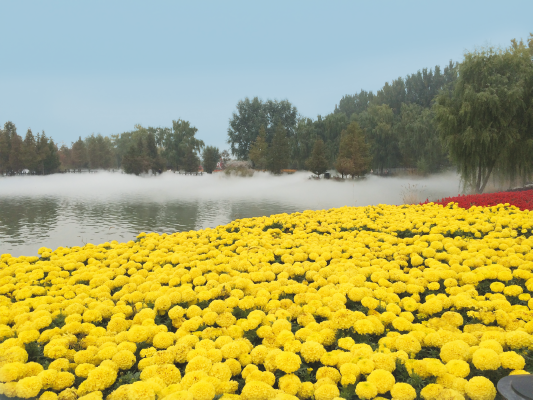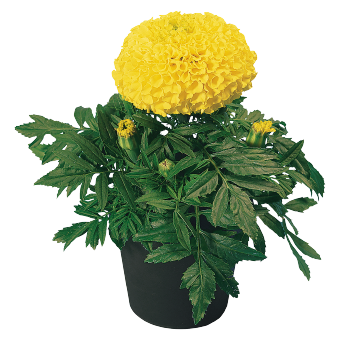

Discovery Yellow
Item no.: TE0202R/C/D- Excellent dwarf african marigold
- Large, densely filled flowers
- Popular for packs, pots and the landscape
- Uniform in height and flower timing
Technical Guide: Click here
All information in our technical guide is based on our own trials and would therefore be as guideline only. Detailed cultivation aspects vary depending on climate, location, time of year and environmental conditions. Benary expressly disclaims any responsibility for the content of such data/information and makes no representation or warranty for the cultivation of any products listed. It is recommended that growers conduct a trial of products under their own conditions.
- Crop Time
- Spring: 8 - 10 weeks
- Height ∅
- 9 ″ / 23 cm
- Width ∅
- 9 ″ / 23 cm
- Exposure
- Sun
- Seed Form
- Raw Seed, Detailed Seed, BeGreen Coating
- Best Uses
- Bedding, Landscape
Culture guide
Usage
Bedding, border, mixed container, summer pots
Sowing method
1 seed per plug
Germination
Stage I : 2-3 days at 72-75 °F (22-24 °C). Sow in media with very low soluble salt levels and pH 6.0-6.5. Cover seed lightly with vermiculite after sowing to maintain moisture levels. Keep soil slightly moist but not wet. Light is not required for germination. At the end of stage I the radicle will have emerged and the cotyledons begin to unfurl.
Growing on
4-5 weeks after sowing transplant 1 plant into 10 cm (4’’) pots or packs. Transplant African Marigold plugs before they become root bound. Delays in transplanting may induce premature flowering.
Media
Use a well-drained, disease free, soilless medium with a pH of 6.2 -6.5; do not allow to fall below 6.0 or Iron or Manganese toxicity may result.
Temperature
18-23 °C (64-73 °F) days, 13-18 °C (55-64 °F) nights. Temperatures that are too low are a cause for a poor quality of the first flowers, too high temperatures encourage flower heads to be reduced in size. Plants for early selling should be hardened slowly at 10-13 °C (50-55 °F). T. erecta does not tolerate frost.
Fertilization
Moderate fertilization levels are required. Fertilize the crop weekly with 150-200 ppm nitrogen, using a complete balanced fertilizer. Avoid high ammonium and high nitrogen levels. High nitrogen levels cause leaves being too large. Check regularly pH value in substrate, because pH below 6.0 can cause necrotic spots on the leaves or yellow leaves.
Stage I Starts with the radicle breaking through the testa. The roots are touching the medium. Ends with fully developed cotyledons.
Stage II Starts from fully developed cotyledons. Ends with the fully developed true leaf or true leaf pair.
Stage III Starts from the fully developed true leaf or true leaf pair and ends with 80% of the young plants being marketable.
Stage IV All young plants are ready for sale and in the process of being hardened off. This stage lasts about 7 days.
The cultural recommendations are based on results from trials conducted under Central European conditions. Different conditions in other parts of the world may lead to deviations in results achieved.




